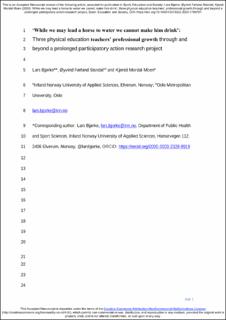| dc.contributor.author | Bjørke, Lars | |
| dc.contributor.author | Standal, Øyvind Førland | |
| dc.contributor.author | Moen, Kjersti Mordal | |
| dc.coverage.spatial | Norway | en_US |
| dc.date.accessioned | 2021-09-15T15:28:05Z | |
| dc.date.available | 2021-09-15T15:28:05Z | |
| dc.date.created | 2020-08-13T13:07:51Z | |
| dc.date.issued | 2020-07-30 | |
| dc.identifier.issn | 1357-3322 | |
| dc.identifier.issn | 1470-1243 | |
| dc.identifier.uri | https://hdl.handle.net/11250/2777468 | |
| dc.description.abstract | Instead of ‘the frenetic rush’ to find effective models of continuing professional development (CPD) that will ‘work’, Armour et al. (2017) suggest rethinking the nature of effective CPD by drawing on the work of John Dewey, and particularly his notion of education as growth. Against this backdrop, the study evaluated three physical education (PE) teachers’ engagement with a prolonged transformative CPD initiative using participatory action research (PAR) to implement Cooperative Learning. More specifically, the study posed two research questions: ‘How do three PE teachers experience their engagement with a prolonged CPD initiative using PAR?’, and ‘How do their experiences facilitate and/or obstruct development and growth?’ I, the first author, took the role of facilitator, supporting the teachers throughout their journeys. The study draws on data from interviews with the teachers conducted at four points through their journey, from nine professional development workshops and from about 100 pages of my reflective diary. On analysing the data, we identified four themes relevant to understanding the teachers’ journeys: ‘PAR as an educative CPD experience’; ‘experiencing Cooperative Learning as something that “works” – and “costs”’; ‘reconstruction of mis-educative experiences’; and ‘further development and growth’. We found that the tension between previous experiences of teaching PE and new experiences of teaching through Cooperative Learning challenged the teachers’ established knowledge and practices. However, not all experiences were equally educative, and some restricted possibilities for further development and growth. We found that the teachers’ journeys beyond the pedagogical intervention developed along different paths, making the project both educative and non-educative. We acknowledge that education must be understood as a complex endeavour (Quennerstedt, 2019), making the directions of teachers’ learning journeys hard to predict. | en_US |
| dc.language.iso | eng | en_US |
| dc.publisher | Routledge | en_US |
| dc.relation.ispartofseries | Sport, Education and Society; | |
| dc.rights | Attribution-NonCommercial-NoDerivatives 4.0 Internasjonal | * |
| dc.rights.uri | http://creativecommons.org/licenses/by-nc-nd/4.0/deed.no | * |
| dc.subject | Participatory action research | en_US |
| dc.subject | Growth | en_US |
| dc.subject | Physical education | en_US |
| dc.subject | Dewey, John | en_US |
| dc.subject | Continuing professional developments | en_US |
| dc.title | ‘While we may lead a horse to water we cannot make him drink’: three physical education teachers’ professional growth through and beyond a prolonged participatory action research project | en_US |
| dc.type | Peer reviewed | en_US |
| dc.type | Journal article | en_US |
| dc.description.version | acceptedVersion | en_US |
| cristin.ispublished | true | |
| cristin.fulltext | postprint | |
| cristin.qualitycode | 2 | |
| dc.identifier.doi | https://doi.org/10.1080/13573322.2020.1799781 | |
| dc.identifier.cristin | 1823166 | |
| dc.source.journal | Sport, Education and Society | en_US |
| dc.source.pagenumber | 1-29 | en_US |

